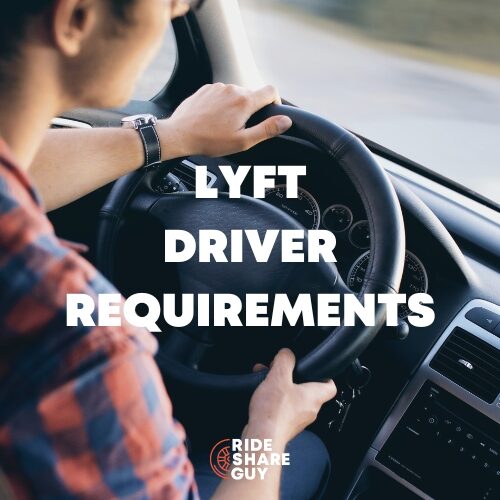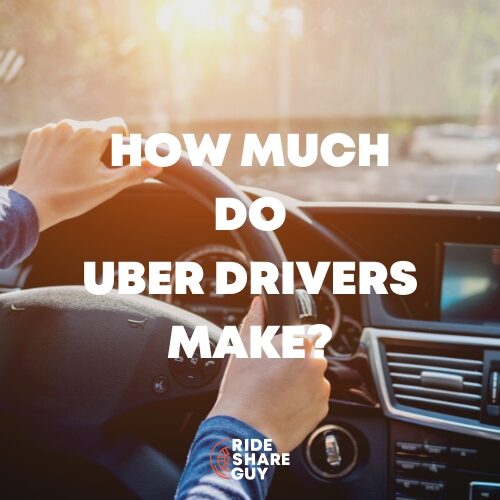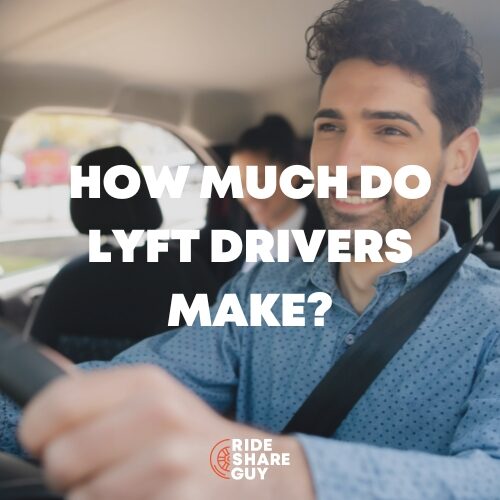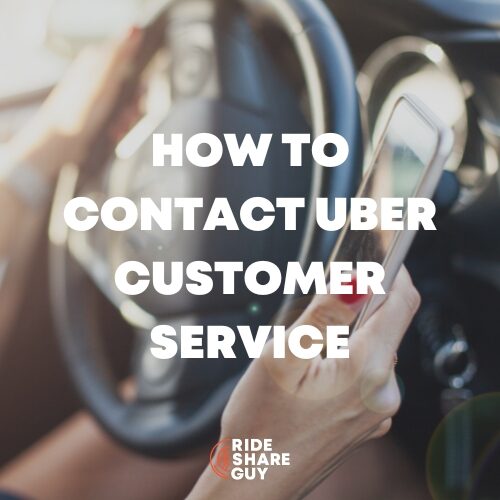Harry here. Big news broke over the weekend that Uber and Lyft are leaving Austin, Texas. Today, RSG senior contributor Christian Perea breaks down exactly what went wrong and why Uber and Lyft are such sore losers when it comes to dealing with the government.
Over the weekend, 56% of Austin citizens rejected a proposition put forward by Uber and Lyft to overturn local TNC un-friendly regulations. Proposition 1 would have repealed a city ordinance enacted by the Austin City Council in December to require mandatory fingerprint-based background checks of all TNC drivers. The December ordinance also required the display of trade dress on vehicles, prohibited stopping in traffic lanes to pickup or drop-off passengers, and the sharing of some data with the city.
In the months leading up to the vote, Lyft and Uber formed a Political Action Committee called “Ridesharing Works for Austin” and poured a little over $9 million into it so they could carpet bomb the airwaves with messages to support their measure and send the city legislature packing with their tails between their legs. In contrast, the PAC against Proposition 1 only managed to raise $100,000. It didn’t matter though, because Uber and Lyft lost anyways.
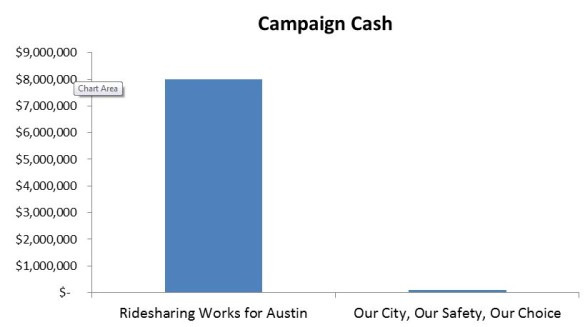
Before the election, both Uber and Lyft made it clear that if Proposition 1 did not pass, they would cease operations in the city instead of complying with local regulations (something they’ve done before in places like Broward County). And since Uber and Lyft did not get their way, around 10,000 jobs (according to Uber’s estimate) are slated to disappear.
Why Are Uber and Lyft Leaving?
Every so often, a local government manages to pass actual legislation regulating TNCs. When this legislation includes fingerprinting, extensive background checks, market controls on drivers, etc., Lyft and Uber almost always threaten to pull the plug. If the government doesn’t loosen the requirements, they will leave the market.
This is part of a political playbook that has been used many times over. TNC companies have found that they can typically get public support to overturn laws that they do not like by mobilizing their passengers and dumping money into campaigns against regulation. This has already played out in many markets, and most of the time it works very well for Uber and Lyft.
It’s already happened in San Antonio, Buffalo, Kansas, Hamptons, New York, Broward County, and now Austin.
The Political Playbook: This Happened in Broward County Last Year
Usually Uber and Lyft will mobilize a full fledged political campaign composed of lobbyists, drivers, petitions, passengers, etc to get these laws overturned. As riders write, tweet and sign petitions to their local legislators, political pressure rapidly builds in support of Uber/Lyft. More often than not, an agreement is reached before the companies pull out of the market.
However, if all of the above brinksmanship fails, then Lyft and Uber will leave a market. Don’t think for a second that they are giving up though.
Uber and Lyft REALLY Hate Fingerprinting
TNCs want need as many drivers as possible in order to sustain their growth and to replace the constant churn of drives (half of all Uber drivers quit after just one year according to Uber). In their ultimate vision, anybody who owns a car would flip on an app and give rides along the way to their destination. A type of future where everybody calls a car whenever they need to go somewhere and car ownership becomes obsolete. But this “vision” requires that the process of becoming a driver be seamless and easy. Otherwise TNCs face being relegated to a (tremendously) expanded version of taxis.
Related: Should Rideshare Drivers Be Required To Get Fingerprinted?
It Limits Part-Time Drivers
TNC companies are so adamantly opposed to local fingerprinting legislation that they will often flat out leave a market when local governments pass regulations that require fingerprinting drivers. They will even do this after investing a great deal of money in lobbying and after mobilizing local passenger campaigns to influence local governments. In the case of Austin, that comes to the tune of around $9 million dollars.
It Is Kinda Expensive
Houston passed a similar law last year. Lyft pulled out of the market while Uber instead opted to remain and comply with local regulations. In this scheme, drivers are responsible for paying for the fingerprinting and licensing before they can get on the road, which amounts to an additional starting cost (in Austin, this cost is estimated to be $40). Obviously all of this hassle and extra fees prevents many drivers from signing up, and makes it more difficult to flood the market with drivers.
They Want To “Self-Regulate”
Both companies would prefer to have the public entrust them to do the right thing in terms of regulating safety, hiring, and pricing. They argue that the traditional taxi system of regulation was inefficient and that their system is better. I personally think that is only partially true since “Self Regulation” from TNCs tends to be more reactive in nature and intrinsically ties two conflicting interests to the same party.
It is kind of like asking your dog to only take ONE treat from the treat bag and then walking out of the room. You know exactly what will happen.
Setting Precedent For Other Cities
TNCs also fear that if they accept these local laws, it will set an example that other cities can follow suit. All or nothing thinking. Many speculate that Austin was such a big show down because TNCs wanted to make an example for other cities considering these regulations.
Places More Power In The Hands of Full-Time Drivers
When drivers are required to invest more time and effort into getting on the road, they tend to be more willing to bargain for better terms in their treatment and pay. Basically they care more.
Last January, we saw that drivers in New York City launched a rather large protest to rate cuts. NYC is an atypical UberX market in that it requires extra licensing, commercial insurance and stricter background checks for drivers. So the environment lends to mainly full-time drivers since the costs prohibit doing it part-time.
The Public Simply Doesn’t Support Uber Like It Used To
In the past, these companies were able to argue for more self-regulation and cite inefficiencies in the cab system as an example of why it should happen. The result being that they could effectively ram any legislation to support their cause that they wanted to.
However, the last year has been blanketed with news of incidents occurring within rideshare vehicles. Lots of reports have fluttered in showing passengers and drivers as victims of assault and other crimes. There has typically been a slow or lackluster response from Uber support, so there is more support for safety now.
As prices have fallen, quality has suffered and many would argue that safety has as well. I think that Uber and Lyft were counting on an easy win from voters who wanted to use their service but found out that rideshare companies simply do not have the same goodwill and public support that they had in the past, especially when it comes to the idea of “Self Regulation”. Typically, start-ups are given a lot more leeway to break things and go against regulations, but Uber is a billion dollar brand and now it just makes them look like a bully.
(And for Austin, the simple fact of trying to buy your own regulations seemed to be a big factor in voter’s decisions.)
They Might Come Back
Often after pulling out, these companies will go back to the bargaining table with local politicians to hammer out a new deal and find a way to re-enter a market. This may or may not be the case in Austin, but it often happens as local governments genuinely want to have these services and TNCs genuinely want to do business. Austin is a huge market for both companies, and I suspect a deal will be hammered out in the next few months that allows them to come back. Otherwise, where will they hold SXSW?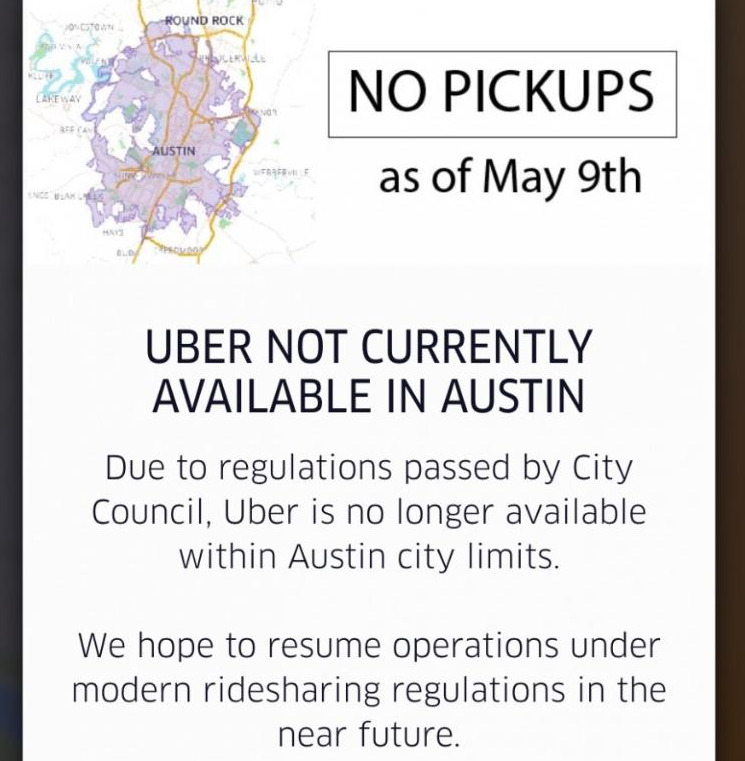
They Haven’t Left The WHOLE Area…
As of 5/9/16, coverage maps for Uber and Lyft within the Austin area show that operations will still continue. However, there will be no pickups within the city limits of Austin. This has led to a both companies removing the city limits from their coverage map and allowing pickups anywhere else within the area.
This will still have a big effect on business though, because I imagine that a fairly large portion of rides originate from within the city limits of Austin. Even more interesting will be how passengers adapt to placing requests. Will they go to an area where they can request a pickup and then take a ride into the city? Will the drivers get cited if they drop off within city limits?
Overall, it looks a lot like the claim of “We will pack up and leave!” is already losing its merit.
My Take
I think leaving Austin is a punk move by TNCs that ultimately hurts passengers and drivers. Both have invested a lot of faith and trust (and money) into these platforms. I don’t like that the jobs of drivers were effectively used as a bargaining chip.
I am also happy that the people of Austin were able to see through a $9 million dollar astro-turfing campaign by TNC’s. Make no mistake: these companies are not being forced to leave Austin. They’re just sore losers.
Readers, what do you think of Uber and Lyft leaving Austin?
-Christian @ RSG
